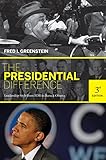The Presidential Difference : Leadership Style from FDR to Barack Obama - Third Edition / Fred I. Greenstein.
Material type: TextPublisher: Princeton, NJ : Princeton University Press, [2012]Copyright date: ©2009Description: 1 online resource (344 p.) : 13 halftones. 1 line illusContent type:
TextPublisher: Princeton, NJ : Princeton University Press, [2012]Copyright date: ©2009Description: 1 online resource (344 p.) : 13 halftones. 1 line illusContent type: - 9780691143835
- 9781400833696
- 973.920922 22
- JK511 .G74 2000eb
- online - DeGruyter
- Issued also in print.
| Item type | Current library | Call number | URL | Status | Notes | Barcode | |
|---|---|---|---|---|---|---|---|
 eBook
eBook
|
Biblioteca "Angelicum" Pont. Univ. S.Tommaso d'Aquino Nuvola online | online - DeGruyter (Browse shelf(Opens below)) | Online access | Not for loan (Accesso limitato) | Accesso per gli utenti autorizzati / Access for authorized users | (dgr)9781400833696 |
Frontmatter -- Contents -- 1. The Presidential Difference -- 2. The Virtuosic Leadership of Franklin D. Roosevelt -- 3. The Uneven Leadership of Harry S. Truman -- 4. The Unexpected Eisenhower -- 5. Coming to Terms with Kennedy -- 6. Lyndon B. Johnson and the Primacy of Politics -- 7. The Paradox of Richard Nixon -- 8. The Instructive Presidency of Gerald Ford -- 9. Jimmy Carter and the Politics of Rectitude -- 10. Ronald Reagan: The Innocent as Agent of Change -- 11. The Highly Tactical Leadership of George H. W. Bush -- 12. The Undisciplined Bill Clinton -- 13. George W. Bush and the Politics of Agenda Control -- 14. The Presidential Breakthrough of Barack Obama -- 15. Lessons from the Modern Presidency -- Appendix: Background on the Modern Presidency -- Notes -- Further Reading -- Acknowledgments -- Index
restricted access online access with authorization star
http://purl.org/coar/access_right/c_16ec
Fred I. Greenstein has long been one of our keenest observers of the modern presidency. In The Presidential Difference, he provides a fascinating and instructive account of the presidential qualities that have served well and poorly in the Oval Office, beginning with Franklin D. Roosevelt's first hundred days. He surveys each president's political skill, vision, cognitive style, organizational capacity, ability to communicate, and emotional intelligence--and argues that the last is the most important in predicting presidential success. Throughout, Greenstein offers a series of bottom-line judgments on each of his thirteen subjects as well as an overarching theory of why presidents succeed or fail. In this new edition, Greenstein assesses President George W. Bush in the wake of his two terms. The book also includes a new chapter on the leadership style of President Obama and how we can expect it to affect his presidency and legacy.
Issued also in print.
Mode of access: Internet via World Wide Web.
In English.
Description based on online resource; title from PDF title page (publisher's Web site, viewed 29. Jul 2021)


